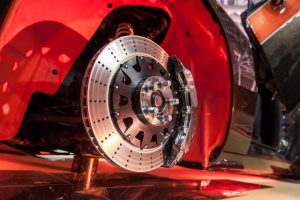If your brakes are not working as they should, you must get them checked out as soon as possible. Many different symptoms indicate the need for brake repair from your Ford dealer. From squealing and grinding noises to a decrease in stopping power, we’ll show you what to look for to ensure you stay safe on the road.
From Your Ford Dealer: 3 Signs That Your Ford Needs a Brake Repair
1. The Dashboard Warning Light Is On

Your Ford is equipped with a brake warning light to let you know when there is an issue with your brakes. If the brake warning light is illuminated, it could indicate a problem with your braking system, such as low brake fluid, air in the brake lines, or worn-out brake pads or rotors. If this light appears, it’s best to take your car for repair as soon as possible.
2. The Brakes Are Squealing or Grinding
If you notice any squealing or grinding noises coming from your brakes, this is a sign that your brakes need repair. Squealing noises are usually caused by worn-out brake pads, while grinding noises can indicate more severe problems. Grinding noises can be caused by metal-on-metal contact between the brake rotor and the caliper. In either case, if you hear these noises from your Ford, it is time to get a professional brake inspection.
Worn-out brake pads may still provide some braking power, but they can no longer deliver optimal performance. When the brake pads become too thin, they can no longer absorb the heat generated from friction during braking, which can lead to warped rotors and further damage to other components in the braking system.
3. The Brake Pedal Is Spongy or Sinking to the Floor
If you press the brake pedal and it feels spongy or sinks to the floor, it could signify a major brake system problem. A spongy or sinking brake pedal means air has entered the brake lines, often caused by leaking calipers or seals, worn brake hoses, or a bad master cylinder. The sponginess can also be caused by low brake fluid levels, which means you need a brake fluid flush and replacement.
If there is insufficient fluid in the master cylinder, it won’t be able to apply enough pressure to the brakes. If the brake fluid has become contaminated, it can also cause a spongy feeling in the pedal.
Staying on top of any potential brake problems is essential. Having your brakes serviced regularly and responding quickly to potential issues can help ensure that your Ford remains safe and road-ready. Visit Nashville Ford today if your Ford brakes need repair.



